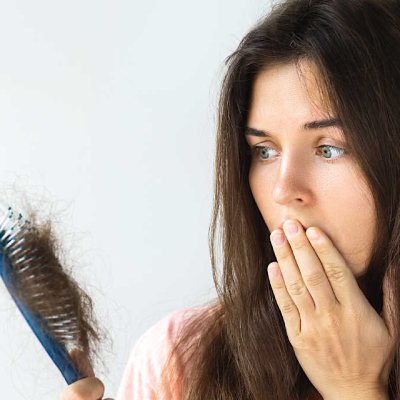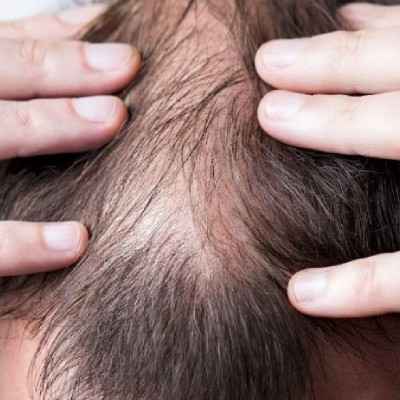Factors Determining Scalp Eczema Flare-Ups

03 October 2019

Hair Experts @ AHS

Have an itchy, irritated and dry scalp? It could be scalp eczema! Scalp eczema is a type of eczema that forms an irritated, itchy and dry skin on your scalp. The peeling off white skin flakes is usually the most evident symptom of scalp eczema.
Have an itchy, irritated and dry scalp? It could be scalp eczema! Scalp eczema is a type of eczema that forms an irritated, itchy and dry skin on your scalp. The peeling off white skin flakes is usually the most evident symptom of scalp eczema.
Scalp eczema can be a stubborn condition that continues for years in patients. It occurs on its own and in the same way, it can disappear on its own.
Seborrheic dermatitis is a chronic form of eczema that is most commonly found on the scalp, but can also develop on other oily areas of your body like your face, sides of your nose, eyelids, eyebrows, upper chest and back.
It is caused by the excessive production of sebum, the natural oils secreted by sebaceous glands in the scalp. It often occurs in infants younger than three months (referred to as cradle cap) and in adults aged 30-60.
What Are the Symptoms of Eczema on the Scalp?
 Common symptoms include:
Common symptoms include:
- Dryness
- Itchiness
- Dandruff
- Flaky scalp
- Redness or inflammation
- Burning sensation
- Greasy/Waxy skin
In severe cases, eczema could cause blisters on the skin that may sometimes release fluids.
What are the Causes of Scalp Eczema?
While the exact scalp eczema causes still remain unidentified, there are several factors that have been known to trigger scalp eczema across populations. These include:
- Hormones
- Genes
- Stress
- Cold and dry weather
- Sweat
- Insomnia
- Oily skin
- Allergic reactions
- Irritants
People with the following pre-existing medical conditions have an increased risk of developing scalp eczema:
- Nervous system disorders, epilepsy, stroke, and traumatic brain injury
- HIV/AIDS
- Other skin conditions, like psoriasis, acne, etc.
- Allergies or a family history of allergies, like asthma, hay fever, and atopic eczema
- Obesity
- Eating disorders or depression
How Do You Treat Eczema on the Scalp?
Although scalp eczema cannot be completely treated, cures for providing some relief and calming flare-ups are plenty:
- Seborrheic and atopic dermatitis can be treated using medicated creams, sprays and gentle shampoos. These products usually contain corticosteroids that can help reduce itchiness and removal of skin flakes.
- To counter the allergic reactions in contact dermatitis, antihistamines along with topical corticosteroids are usually prescribed. Over the counter medicines containing salicylic acid, zinc pyrithione, ketoconazole and selenium sulfide also help in scalp eczema treatment.
- Lifestyle changes like avoiding food that causes flare-ups, wearing a hat while stepping out in the sun, using minimal hair products and drinking plenty of water to keep your skin hydrated can prove beneficial. If over the counter products and lifestyle changes do not help, we suggest you visit your doctor.
How Can I Get Rid of Eczema on My Scalp Naturally?
All natural home treatment with little or no side effects can surely help to accelerate the medical treatment for eczema. Depending on your skin type and eczema severity, consult your doctor on which among these scalp eczema natural treatments could do you good.
Apple Cider Vinegar
Applying a diluted solution of apple cider vinegar and rinsing your hair can help you loosen the scales on your scalp.
Tea Tree oil
Applying products with tea tree essential oil can help reduce the itchiness on your scalp, thanks to its antifungal and anti-inflammatory properties.
Aloe Vera
Consuming supplements with aloe vera can provide relief from flare-ups which can ease the symptoms.
Fish oil
It is well-known that supplements with fish oil suppress flare-ups and also boost overall immunity.
Olive oil
Applying olive oil on your scalp and leaving it on for a few minutes before you shampoo can remove the scales from your scalp.
Coconut oil
Massaging your hair with coconut oil and rinsing off with warm water can also help treat scalp eczema.
Diet
Consuming food that is good for your immune system with anti-inflammatory properties like berries, green leafy vegetables, tomatoes, almonds, avocados, olive oil, sweet potatoes and citrus fruits can help decrease eczema symptoms.
What Foods Trigger Eczema Flare Ups?
Food allergies are very common among people with eczema. Food allergies happen when the immune system sends an abnormal response post eating certain foods. If you suffer from eczema, a good thing to do perhaps would be to take notes every time you experience a flare up post eating specific foods. This could help you completely exclude those food items from your diet.
Common allergens include foods like:
- Eggs
- Cow’s milk
- Fish
- Shellfish
- Peanuts
- Tree nuts
- Soy products
- Gluten
It is important to know that eating these foods does not cause eczema but can trigger a flare up if the condition already prevails.
How Do I Identify If I Have Scalp Eczema?
The most visible symptom of scalp eczema is skin patches on your scalp. Depending on the severity and kind of your eczema, these patches could be red and inflamed, itchy, greasy or waxy and may sometimes ooze and weep.
However, it is important to tell scalp eczema apart from other skin conditions that may have similar symptoms. These include rosacea, atopic eczema (which mostly occurs in people with asthma and similar allergies), psoriasis and contact dermatitis (mostly caused by an allergic reaction).
Scalp eczema is most often confused with psoriasis, which is an autoimmune disease. The skin patches caused by psoriasis are usually thicker, gray in color and bleed much more easily when scratched. If you are unsure about what could be causing your scalp issue, it is best to visit a dermatologist.
Does Scalp Eczema Cause Hair Loss?
One of the clearest symptoms of scalp eczema is an itchy scalp. While scalp eczema is not directly linked to hair loss, excessive scratching may damage hair follicles eventually leading to hair loss.
In some people, overproduction of sebum – a thick oily secretion from our sebaceous glands can also cause inflammation in the scalp. This inflammation hinders the process of hair growth too. Scalp eczema hair loss is definitely something to worry about as its symptoms could surely hamper hair growth.
Is Eczema a Sign of a Weak Immune System?
As opposed to the popular belief, eczema could actually be a sign of an overactive immune system. Our skin acts as a barrier and prevents penetration of external bacteria into our bodies. However, eczema compromises this very function of the skin activating the immune system every time it perceives a threat.
This is exactly what causes inflammation or itchiness in eczema prone skin. So it’s not the weak immune system but the instant response from it due the inability of skin to avert external substances that is the issue.
How to Prevent Scalp Eczema Flare-Ups?

The sternness of seborrheic dermatitis may be reduced by keeping a check on the triggers and taking care of the skin. To manage scalp eczema and help avoid flare-ups, do your best to follow these references:
- Avoid exposure to any supposed allergens and irritants.
- Clean your scalp thoroughly, using a gentle shampoo and warm water and also avoid hot water.
- Keep your stress level under control.
- Shampoo your hair after you’ve been sweating heavily, such as after a workout, since moisture can be a trigger.
- Exposure to the sun for some people can also improve symptoms.
End Note
Scalp eczema is a chronic condition, but with natural remedies, it can be effectively managed. However, if other remedies aren’t successful or don’t help you get scalp eczema under control, you can contact the nearest Advanced Hair Studio for effective scalp eczema treatment.
Our hair experts will help detect the triggers for scalp eczema and will give you a prescription treatment and a customized hair loss solution.
Book your appointment with Advanced Hair Studio as soon as possible if your eczema-related skin patches form crusts, drain fluid, or become very red or sore. Our surgeons and hair experts have years of experience and have been successfully performing hair treatments. Our clients come from all over the world and each one has their own success story!
Stay Updated
Subscribe to our email newsletter for helpful tips and valuable resourses
Be an influencer
Join forces with Advanced Hair Studio! Explore exciting collaboration opportunities tailored for influencers. Let's redefine haircare together.
Connect now












